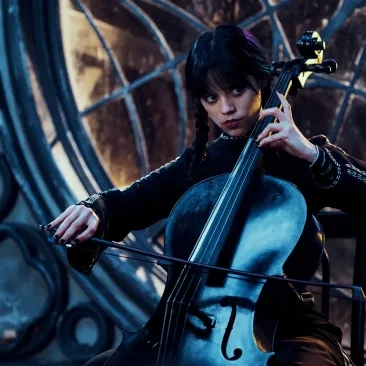How to Get a Job Tracking Strings for Hollywood, from SFCM's Strings Chair
James' work has also made it to the world of video games; he can be heard on iconic games in the 'Halo' and 'Diablo' franchises.
There are a few "Simon James" pages on IMDB, but when you find the one belonging to SFCM's Strings Chair, you'll know by the 123 Music Department credits.
For nearly three decades, Violin faculty James was a mainstay in the world of big-budget soundtrack work, working on everything from Wedding Crashers to Avengers spin-offs. As the second season of Wednesday again features its titular character performing works from the cello repertoire onscreen, James' experience in Hollywood is a valuable one for students with an eye towards a career being heard on the silver screen.
For situations like Wednesday, James says, it's rarer for a musician to appear onscreen actually playing (or mimicing) their own work on the soundtrack, a situation that would need to be worked out with both music and acting unions. It's more likely a professional musician would be enlisted to attempt to train an actor to mime along to their playing, a situation he was put in while working on David Lynch and Mark Frost's iconic TV series Twin Peaks. Fun fact: "The person who did it best of anybody that I've ever seen so far as a string instrument was concerned was Julie Andrews," James divulges. "She's no violinist, but she faked it pretty damn well."
As far as his own playing, James picked up film work in his native Australia in the 1980s and can be heard on a number of iconic films produced there, from the Oscar-nominated Breaker Morant to the original Mad Max. But his entry into Hollywood came via an unexpected route: fundraising for the Seattle Symphony. (A decades-long veteran with the organization, James stepped down in 2021 to focus on teaching.)
"When I joined the Seattle Symphony, I decided I wanted to be part of the solution rather than the problem," James says, before adding, "the solution is always money." He joined their annual gifts committee and played at various events for political campaigns or private companies like Microsoft in Seattle when one major catalyst jump-started his career: A strike and work stoppage for the Symphony that threatened to upend an already-contracted recording date. "I was asked to hire an orchestra to fulfill this contract; most of the work was already done, it just fell into my lap. But the orchestrator and conductor on that gig was so thrilled that he started calling his friends and saying, 'This experience up in Seattle was really good.'"
The Seattle Symphony had left the American Federation of Musicians the year prior for entirely separate reasons, but being a non-union ensemble meant that they had the freedom to set their own recording rates, and as James says, "from there, I just went ballistic for 25 years."
"I discovered very early on that it was always in my best interest to make sure that every single seat that I possibly could fill with a great player, I did," James explains, even when that meant flying them in at his own expense for the sake of the overall sound. He acknowledges other factors as well: Seattle's relative proximity to Hollywood, for one; as well as the fact that many European orchestras tuned higher than the American standard of concert A equalling 440 hz, which complicates overdubbing. "But basically," he says, "word of mouth is how this business works. If everything sounds great and it comes out of our orchestra, Hollywood comes back. And if we suck," he adds with a laugh, "bye-bye!" It was also a time when the internet began to ease the difficulty of remote collaboration, so he often received and completed work without ever meeting the other parties face-to-face.
However, when one can, appearing as both an actor and musician is quite lucrative: "One of the things that I did actually early on in my contracting days was a Folgers coffee commercial in, I think, 1986," James remembers. "I ended up being on screen for it; I was maybe there for three hours. It ran nationally and so it paid out over $45,000 over three years." (That's in excess of $133,000 adjusted for inflation!)
One thing that might not be apparent for young musicians in Hollywood is that recording and actually making it into the finished film's soundtrack are two very different things. "Movies get redone for many, many reasons," James says. "Composers work under several kinds of agreements: One is a creative fee and the other one is what they call a package fee, where the studio gives a composer a bunch of money and they have to do everything themselves, as opposed to a creative fee, where they negotiate to make x amount and the studio picks up the rest. I did a movie called Keeping the Faith and I think we recorded that soundtrack three times. That was composed by Elmer Bernstein, and he didn't care because he was getting paid by the measure or something like that—but if he'd taken a package deal he would have been dying."
James also stresses that musicians should be prepared to fill in the gaps, so to speak, between the composer and the page, hailing the work of orchestrators like Tim Simonec, whom James singles out for praise. "The orchestrators are a very important part of the process. I can remember actually seeing a now-famous composer writing a video game who had basically just spit stuff out of his synthesizer onto the stand; it was so thick and so heavy and had so many notes. Simonec's genius is actually calling the stuff that needed to be there and knowing how to fix that."
"I don't think it's a bad thing [to have orchestrators]," he continues, "because you're on a tight clock recording and scores have to be precisely timed to what's happening onscreen. I remember doing Die Hard and Michael Kamen would show up with a whole team of orchestrators rewriting cues in the hallway while we were recording a different part of the score." But he jokes, "There are obviously also guys who are what I used to generally call 'hummers,' who'd hum something and get a melody down with a MIDI keyboard and then send it over to their orchestrators for everything else." (James adds that he remembers one session composed by a rock musician who later didn't recognize his own work upon hearing it back because it had been so dramatically reshaped after his initial contributions.)
(SFCM's Technology and Applied Composition (TAC) Department offers students a glimpse into the life of a film and video game composer and musician. Not only do students from across the entire school get to contribute to TAC students' recording projects, but faculty members, like TAC grad-turned-professor Daria Novo, work as orchestrators or composers for the likes of Netflix and AAA video game companies.)
James' advice for young musicians looking to his career as a model is twofold. "For the composer who wants to get into composition: Be somebody's grunt," he says. "[Oscar and GRAMMY-winning composer] Michael Giacchino started working in the Disney Animation Office. I did a bunch of stuff with Michael; he was one of my clients, and he worked his way up, slowly but surely."
James adds, "You just have to meet people. You can't just expect that your fabulous playing is going to do you any good, first you have to be a good citizen. Take local auditions, get on the extra list for those ensembles and eventually you start meeting people and eventually the people you meet will actually open doors for you."
"But in order for that to be the case," he continues, "show up early. Don't talk. Don't play your excerpts. Don't try and show everybody that you're a genius between takes. Be friendly! Eventually, you'll get a crew of people around you who are going to say, 'Yeah, they play really well, and they're a professional, nice person. You should try them.'"

